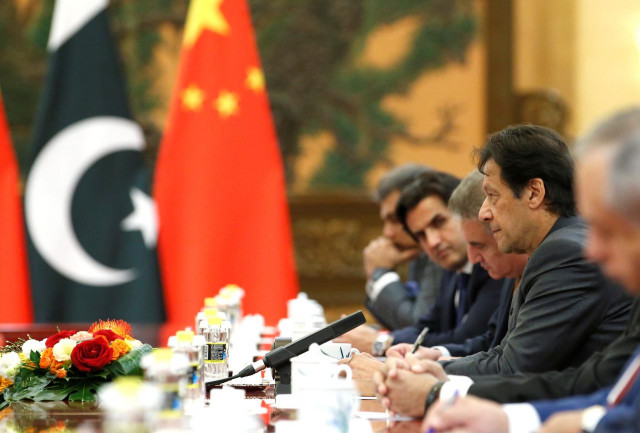China reluctant to approve $6b ML-I loan
Express concern over Pakistan’s growing debt

Expressing concern over Pakistan’s growing debt, China has shown reluctance to approve $6 billion loan for the Mainline-I (ML-I) railway track -- the single largest project under the China-Pakistan Economic Corridor -- according to the record of a meeting and senior Pakistani officials.
The construction of ML-1 project in three phases had been approved by the Executive Committee of National Economic Council (Ecnec) in its meeting held in August last year. The actual cost of the project was $9bn initially, including equity amount of the government of Pakistan. But later, it was reduced gradually to $6.8bn.
“Beijing conveyed its concerns during a meeting held on March 30 to discuss financing modalities of the project,” the officials added.
Moreover, the officials said China also termed the total project cost of $6.8 billion at the lower side, which Islamabad is now willing to increase further by 15% or $1 billion.
The sources said that in the last meeting, Chinese authorities were wary of Pakistan’s ability to service its debt. The concerns have now also been reflected in the meeting records.
Read; Pakistan to spend $6b to boost growth: Tarin
“The Chinese side have sought clarification regarding the possibility of raising further debt by Pakistan during currency of the IMF programme. The Pakistani side clarified that debt situation is being monitored and there is no restriction under the programme to raise debt for viable projects,” Deputy Chairman Planning Commission Dr Jehanzeb Khan told The Express Tribune while responding to a question.
The Chinese sides also showed its reservations over restrictions imposed by Group 20 nations and the International Monetary Fund which, in Beijing’s view, could undermine the ML-1 project, according to discussions that take took place in the last ML-I Financing Committee meeting held on March 30th.
“The Chinese side expressed concerns about Pakistan’s debts, including IMF’s requirements for the Pakistani government to avail loans and about the impact of restrictions under the G-20 Debt Servicing Suspension Initiative (DSSI) on the financing of the ML-I project,” showed a correspondence between Pakistan and China.
Pakistan’s public debt has jumped to 87.2% of the Gross Domestic Product at the end of the last fiscal year and the country is consuming over 60% of tax revenues in debt servicing. It was 72.5% of the GDP when the PML-N tenure ended about three years ago.
Pakistan has also availed the G-20 temporary debt relief worth $3.5 billion from July 2020 through December 2021 which, according to Beijing, was a signal of weakening debt repayment capacity.
“However, Pakistani authorities tried to remove the reservations shown by their Chinese counterpart,” the officials told The Express Tribune.
The Pakistani side stated that the IMF has not imposed any restriction on loans for the ML-I project and that country’s foreign debt was largely under control and the government has the ability to repay the debts, according to the documents.
The Pakistani side held that the implementation of the ML-I project would bring multiple benefits to Pakistan Railways, in addition to improving the financial situation of the company.
The ML-I project includes dualization and upgrading of the 1,872km railway track from Peshawar to Karachi and is a major milestone for the second phase of CPEC and its construction is facing a delay of over three years.
The government has planned to complete the ML-I project in various packages, spanning over almost 10 years and aimed at spreading the loan over a longer period due to concerns expressed by the IMF.
China also highlighted the dilapidated financial condition of Pakistan Railways that do not allow it to take $6 billion new debt on its books.
The negotiations to secure the loan have been going on for the last over one year but so far no conclusion has been reached. The project is facing delays of over three years against the original schedule agreed between the two countries.
In a meeting held on March 30, Pakistan again expected that the loan currency would be a combination of RMB and the US dollar, covering 85% of the project cost, with an interest rate comparable to the infrastructure project under CPEC and promised that the Pakistani government would provide guarantees.
The share of each currency has not been indicated in the revised term sheet. China wants to give the $6 billion loan in RMB, as it competes with global dominance of the US dollar.
Read more: Despite IMF loan, China remains country's lifeline
“Pakistan has not yet accepted the Chinese stance of getting a mix of commercial and concessionary loans,” said the sources. Both the sides have not converged on the loan payback period. China has proposed 15 to 20-year payback period, including a five-year grace period.
Pakistan has asked for a 25-year repayment period, including a 10-year grace period.
The Chinese ambassador to Pakistan, Nong Rong, on Friday met with Minister for Planning Asad Umar and discussed matters related to bilateral relations and projects under the CPEC and the upcoming Joint Cooperation Committee meeting, according to a Planning Ministry handout.
But the handout was silent on the the 10th JCC meeting date, which Pakistan has been trying to hold since October last year.
The sources said that Asad Umar pointed that a deal on ML-I was important to showcase the JCC as a successful event. The sources added China was reluctant to hold the JCC until it is assured that CPEC is fully back on track.
Both the sides have now agreed that a joint roadmap to push forward the ML-I project implementation that will entail confirming financial terms, launching bidding process and concluding the commercial contract, will be finalised.


















COMMENTS
Comments are moderated and generally will be posted if they are on-topic and not abusive.
For more information, please see our Comments FAQ